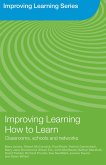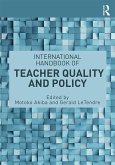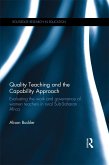The teacher work sample (TWS) has become increasingly widely adopted as an end-of-program, performance-based assessment for student teachers. Improving Teacher Quality offers a comprehensive introduction to teacher work sample methodology for teacher educators, student teachers, student teacher supervisors, cooperating teachers, program coordinators, and school administrators. This well-organized and clearly written guide shows how implementation of the TWS can catalyze a series of widespread changes in assessment, teaching, and program improvement. The authors use their extensive experience to describe how to implement the TWS in a carefully sequenced progression that includes creating a valid and reliable system of scoring, teaching reflective thinking skills, making program improvements, and conducting research with TWS data. Helpful suggestions are provided throughout for those interested in adopting the TWS as a performance-based assessment in their teacher education program, those interested in how the TWS can provide evidence of minimal competency, and those interested in how the TWS can provide data for making program improvements.
Bitte wählen Sie Ihr Anliegen aus.
Rechnungen
Retourenschein anfordern
Bestellstatus
Storno









